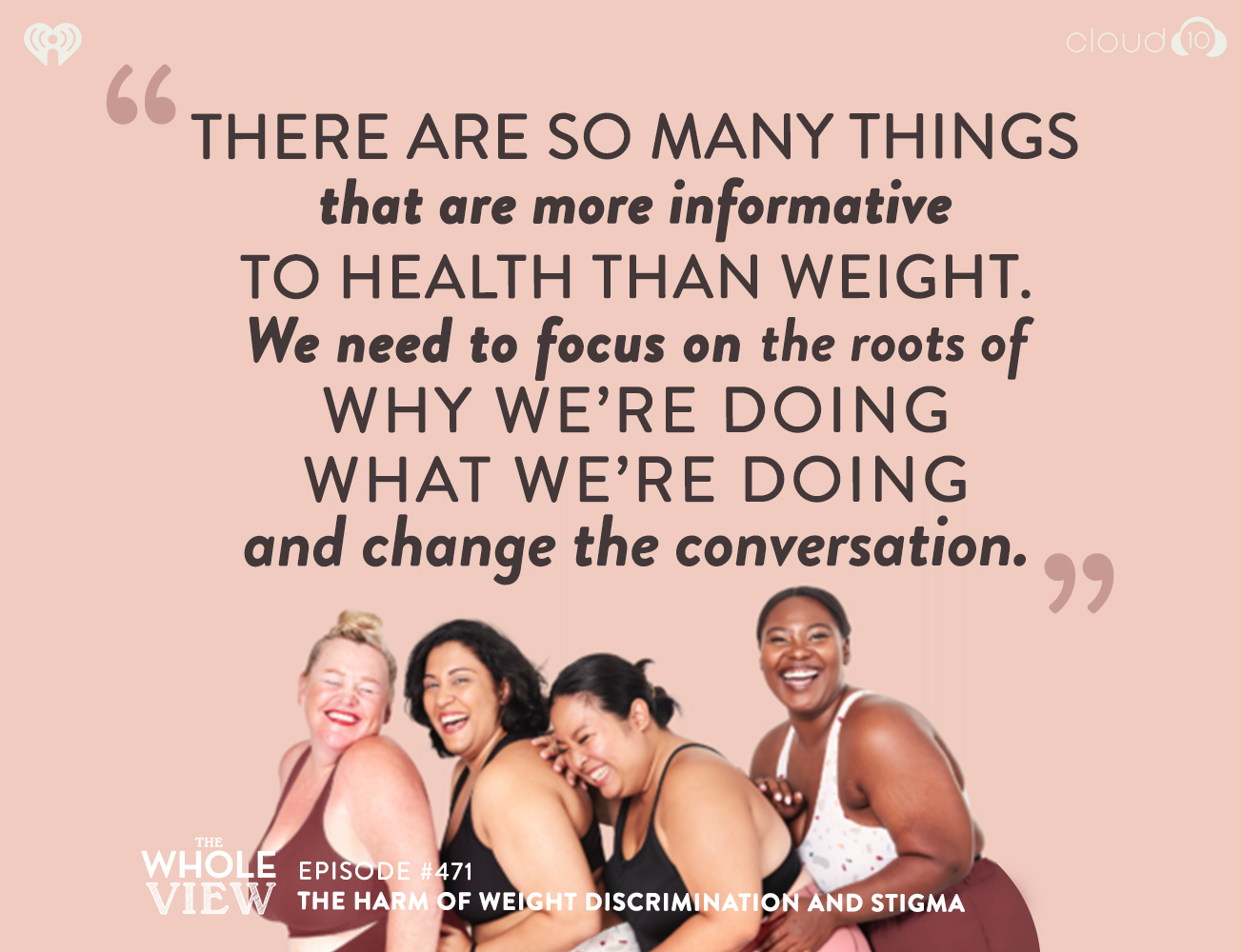
Welcome to episode 471 of The Whole View! This week, Stacy and Dr. Sarah dive into the science behind the harm weight discrimination and stigma cause. They look what modern research shows about “ideal” weight, how BMI is an inaccurate measure of health, and offer insight into how we can better approach health vs. weight.
If you enjoy the show, please review it on iTunes!
The Whole View, Episode 471: The Harm of Weight Discrimination and Stigma – Part 1
Welcome back to episode 471! (0:28)
Almost exactly a year ago, Stacy and Dr. Sarah first dove into the science on weight discrimination and weight stigma in Episode 421: The Science Behind Body Image.
It was eye-opening for both of them because weight loss was part of their health and professional journeys.
At the time, Stacy plugged into the Body Positivity movement much more than Sarah.
Sarah wasn’t, and it was really emotionally challenging for her to internalize that information.
In episode 421, Stacy and Dr. Sarah did an overview of the science on the harm of weight stigma, including racial disparities. They talked a lot about their feelings on the topic and their experiences with weight discrimination.
Skinny Doesn’t Equal Healthy
In Episode 436: What Is Health, and How Do You Measure It?, Stacy and Dr. Sarah discuss how weight isn’t a very good measure of health.
Sarah was surprised by the amount of body-shaming replies she received in response. She’s spent a few weeks going super deep into the science of health at any and every size.
Stacy is so proud of everyone being open to learning. Of course, not everyone has the same struggles, but weight shame is so pervasive in our culture that it’s hard to see.
Whether you wish you were smaller, or bigger, or shaped differently somewhere, there is someone out there who wishes what you had because we’re taught to be unhappy with our bodies.
Whether the guise of “wanting to be our best selves” or “just get healthier” weight and the same of it is not just one of the last legal discriminations: it’s harmful to health.
It’s also worth noting neither Sarah nor Stacy have “ideal” bodies. That doesn’t make them any less worthy of sharing facts, nor does it make you any less worthy of living your best life.
It can be tough for those who have struggled with weight to let go of the internalized bias and those feeling of failure and inadequacy.
Sarah wrote an epic article called Can You Really Be Healthy at Any Size? It covers this topic with a bit of a different angle, including more history, than what they’re talking about today. There’s many citations that will take you right to the papers!
Quick Word From Today’s Sponsor
Paleovalley sponsors this show! Stacy and Dr. Sarah love their collagen products and personally use them.
Paleovalley uses 100% grass-fed bone broth protein that is pesticide- and antibiotic-free! They also do 3rd party testing to ensure you’re getting a clean, healthy product.
It has almost no flavor, making it a perfect addition to your coffee and smoothies.
Head to Paleovalley’s website and enter code THEWHOLEVIEW at checkout to receive 15% off your order.
“Correlation Does Not Equal Causation”
First, Sarah dislikes this phrase even more than “everything in moderation” because it often dismisses epidemiological studies even when mechanistic studies back them up. But in this case, it’s true. (21:00)
Doctors associate many chronic diseases with obesity, including heart disease, type 2 diabetes, non-alcoholic fatty liver disease, and cancer. However, many important studies from the past 20+ years have revealed that overweight and obesity themselves are not the risk factor.
Instead, they’re symptoms of an underlying health challenge like chronic stress, gut dysbiosis, hypothyroidism, or insulin resistance.
They are also indicators of poor health-related behaviors like sedentary lifestyle or poor diet quality.
It’s these latter factors and not body weight itself that increase the risk of chronic illness.
Stacy and Sarah will cover some of the same studies we talked about in episode 421, but we’re filling in a lot of the gaps today.
Don’t Conflate Overweight/Obese with Unhealthy
A 2008 study showed that overweight and obesity were not synonymous with being metabolically unhealthy.
Researchers evaluated the cardiometabolic health of over 5,400 participants and deemed them metabolically abnormal if 2 or more indices were elevated. This included blood pressure, serum triglycerides, fasting plasma glucose, C-reactive protein, HOMA index, and serum LDL “bad” cholesterol.
Among overweight individuals, 51.3% were metabolically healthy; among obese individuals, 31.7% were metabolically healthy. And, among normal-weight individuals, 23.5% were metabolically abnormal.
These data bust the myth that people who are overweight or obese are unhealthy and that thin people are healthy by default.
This study went further to evaluate risk factors other than—but striated by—weight for poor cardiometabolic health.
Among normal-weight individuals, being older aged, male, and physically inactive increased metabolic abnormalities.
And among overweight and obese people, being middle-aged or older, male, and a race/ethnicity other than non-Hispanic Black, as well as imbibing more than two alcoholic beverages per day, smoking (current or ever), having a sedentary lifestyle, and having a high waist circumference each independently increased risk of metabolic abnormalities.
Physical activity was the most protective for both normal-weight and overweight/obese individuals.
The Role of BMI
A 1999 prospective study of over 25,000 men evaluated BMI relative to other risk factors for cardiovascular disease (CVD) mortality and all-cause mortality (a general indicator of health and longevity) over at least a 10-year follow-up period.
While overweight and obese individuals had an increased risk of dying from cardiovascular disease (2.6X higher risk of dying from CVD) or from any cause (1.9X higher risk of dying from any cause). They were also much more likely than normal-weight men to be sedentary.
However, when the participants were striated based on physical fitness and weight, a very different picture of the true risks for mortality emerged.
Compared to fit normal-weight men, normal-weight unfit men had a 3.1X higher risk of dying from cardiovascular disease, overweight, unfit men had a 4.5X higher risk, and obese unfit men had a 5.0X higher risk.
But, physical fitness was incredibly protective of all sizes. Overweight fit men only had a 1.5X higher risk of dying from cardiovascular disease. Obese fit men only had a 1.6X higher risk compared to fit normal-weight men.
The difference was even starker when comparing the relative risk of all-cause mortality. Compared to fit normal-weight men, normal-weight unfit men had a 2.2X higher risk of dying from any cause. Overweight, unfit men had a 2.5X higher risk, and obese unfit men had a 3.1X higher risk.
Here’s the kicker: fit overweight and obese men only had a 1.1X higher risk of dying from any cause compared to fit normal-weight men!
The implication here is that, while fit, overweight and obese men still had a slightly higher risk of dying from cardiovascular disease than fit normal-weight men. However, they had higher levels of protection from non-cardiovascular disease-related mortality to have near-identical all-cause mortality risk.
Weight Discrimination And Stigma
The authors concluded that low fitness was an independent predictor of mortality in all body mass index groups after adjustment for other mortality predictors. They also concluded it was of comparable, if not of greater, importance to diabetes co-morbidity, elevated serum cholesterol, hypertension, and smoking status.
The only risk factor that was more important than fitness was cardiovascular disease (previously diagnosed).
Overall, this study showed that sedentary people were more likely to be overweight or obese. And that it was the poor cardiorespiratory fitness that increased the risk of all-cause mortality rather than being overweight or obese itself.
And other studies (like this one and this one) have shown consistent results for both men and women, irrespective of whether BMI, body fat percentage, body fat mass, or waist circumference is used to differentiate overweight from normal-weight individuals.
Furthermore, these studies show that rather than exercise being protective because it is a weight-loss tool, living an active lifestyle is protective regardless of weight.
Even More Evidence on Weight Discrimination And Stigma
A 2005 study (which incidentally controlled for gender, age, and smoking, which many other studies before that time did not do) found individuals in the overweight category (BMI between 25 and 30) had lower mortality rates than people in the normal weight category (BMI between 18.5 and 25). (51:50)
Those underweight (BMI less than 18.5) had the highest mortality rate in the whole study.
Further striating the data by age and smoking status was even more interesting.
For example, in people over 70-years old, being underweight increased mortality risk by 1.69X, whereas class II obesity (BMI greater than 35) only increased mortality risk by 1.17X.
Having a normal BMI or class 1 obesity (BMI between 30 and 35) was comparable in mortality risk, and overweight had the lowest mortality risk.
And in never-smokers aged 25 to 59, overweight and class 1 obesity had lower mortality risk (36% and 23% lower, respectively) than normal-weight individuals. Underweight and class 2 obesity had identical elevated mortality risk at 1.25X.
A 2013 meta-analysis of 97 studies, including more than 2.88 million individuals, and more than 270,000 deaths, confirmed that class 1 obesity overall was not associated with higher mortality.
They also associated being overweight with significantly lower all-cause mortality compared to normal-weight individuals.
Stacy’s Take
The one that stood out to Stacy is that the BMI chart is more often wrong than right.
What she’s hearing is that being overweight or obese does not automatically make you healthy, NOR does it automatically make you unhealthy. It’s the same with being thin.
Health assumptions based on bodyweight do a disservice. It propels weight stigma and the health detriments thereof for overweight people.
It also fails to identify risk factors for normal-weight people.
Stacy often asks herself, “how would I feel if a thin person were doing that thing?” It helps her identify those lingering fatphobic and judgmental thoughts because, honestly, someone else’s body isn’t anyone else’s business.
Losing Weight Does Not Make You Healthier
The most common prescription for weight loss is dieting. It has long been known that the majority (77%) of people who lose weight gain all the weight back (and often more) within five years. (1:07:30)
Experts attribute this to the concurrent rise in ghrelin and drop in basal metabolic rate that occurs when we lose weight, especially quickly. This effectively means that the more weight someone loses, the more willpower they need to maintain a caloric deficit.
So, if losing weight makes us healthier, why does the body fight so hard against it?
Even more problematic is yo-yo dieting. During weight loss, the body loses some muscle mass as well as body fat. During the weight regain phase of yo-yo dieting, fat is regained more easily than muscle.
The net effect is that yo-yo dieters have a greater risk for type 2 diabetes, cardiovascular disease, and non-alcoholic fatty liver disease than if they simply remained overweight or obese. That’s in addition to having an increased risk of depression and eating disorders.
See TPV Podcast Episode 353: Beach Body Yo-Yo!
The Longer Lifespan Myth
It’s also worth noting that scientific studies have not proven that intentionally losing weight prolongs life. Some studies even show the opposite!
A 1995 study showed that women aged 40 to 64, who had never smoked and who had no pre-existing conditions, who intentionally lost less than 20 pounds had an increased mortality rate during the follow-up period.
In women with obesity-related health conditions, intentional weight loss of any amount associates with a 20% reduction in all-cause mortality. This is primarily due to a 40-50% reduction in mortality from obesity-related cancers; diabetes-associated mortality was also reduced by 30-40% in those who intentionally lost weight.
In women with no pre-existing illness, researchers associated intentional weight loss of > or = 20 lb that occurred within the previous year with a 25% reduction in all-cause, cardiovascular, and cancer mortality;
However, an association between a loss of < 20 lb, or loss that occurred for> or = 1 year and small to modest increases in mortality.
Even More Evidence on Weight Discrimination And Stigma
A 1999 study from the same research group showed that men without pre-existing conditions who intentionally lost over 20 pounds had a 48% increased risk of diabetes-associated mortality during the follow-up period.
Men with pre-existing conditions who intentionally lost over 20 pounds had a 25% higher cancer mortality rate.
Among men with no reported health conditions, results did not associate intentional weight loss with total cardiovascular (CVD) or cancer mortality.
But diabetes-associated mortality increased to 48% among those who lost 20 pounds or more. This increase was largely related to non-CVD mortality.
Results did not associate intentional weight loss with total or CVD mortality among men with reported health conditions. However, cancer mortality increased 25% among those who lost 20 pounds or more.
Diabetes-associated mortality reduced to 32% among those who lost less than 20 pounds and 36% those who lost more than 20 pounds.
These studies show that intentional weight loss can improve outcomes in some situations (for example, type 2 diabetics) but worsen outcomes in others.
Final Thoughts
Stacy clarifies that she and Sarah are not saying that losing weight makes you unhealthy. But losing weight by itself doesn’t make you healthy, either. (1:26:00)
Health is related to our diet and lifestyle, and improving those may or may not go along with health.
Plus, focusing too much on weight as a sign of health results in a lot of weight discrimination and stigma.
An example of this is the people who do the “Twinkie diets” to prove that eating a limited number of calories will cause you to lose weight (example). But do we think those people are healthier for eating nothing but twinkies for a month? No way!
Losing weight can be beneficial for certain health conditions, such as insulin regulation in people with diabetes.
We invite you to subscribe to this channel and the realeverything.com and thepaleomom.com blogs and newsletters.
If you haven’t joined the Patreon family yet, head over for exclusive behind-the-scenes content about how Stacy and Sarah feel about the topics they discuss. Your subscription goes to support this show and gets you direct access to Stacy and Sarah.
Thank you so much for listening, and we’ll see you next week for part 2 of weight discrimination and stigma!

Want more info on our Real Life? Healthy recipes, parenting tips, and general lifestyle stuff goes out in our Real Everything newsletter, join here.
Never want to miss a post, sale, or deal? Join my Healthy Inside & Out e-mail list for more info on non-toxic living and safer skincare!



